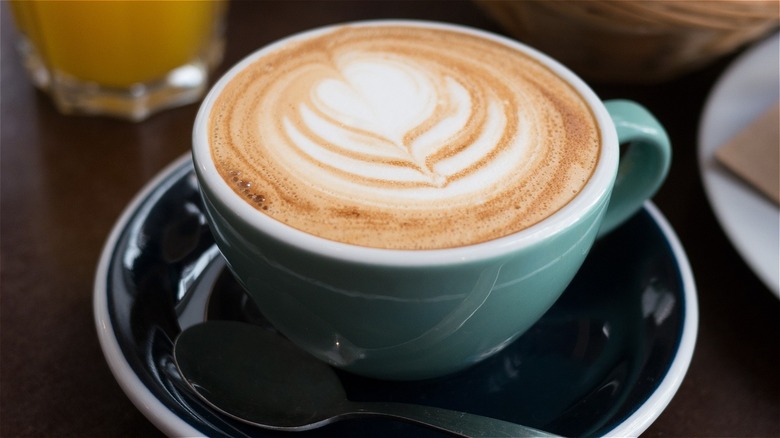Here's Why Italians Won't Drink Cappuccinos After This Time
As YouTube personality and award-winning barista James Hoffman details, "Coffee culture is woven deeply into Italian culture." With so many recognizable Italian names for coffee-laden drinks like the macchiato, latte, and espresso, it's no surprise that coffee culture is as big as it is in Italy. Hoffman is a coffee expert who explores topics like which store-bought instant coffee tastes the best and whether should we be deep-frying our coffee. He also shares many coffee machine reviews and, for many YouYube viewers, he is a huge authority on what's what in the world of coffee.
The world of coffee in this case doesn't stop at just instant coffee, however, or even at coffee in the United Kingdom where Hoffman is from. In this case, it includes coffee specifically consumed in Italy. It turns out that just as many people have their own personal standards when it comes to coffee, there are culture-specific rules that vary from country to country as well. One rule that Italians have about drinking a cappuccino, specifically, is quite perplexing in that it dictates the time at which you should stop drinking them, and it's earlier in the day than you might guess. We have to begin by asking ourselves, what exactly is it that goes into a cappuccino that makes Italians hesitant to drink one before a certain time? Well, if you're anything like more than half of the population on Earth, you know the answer to this question all too well.
Milky coffee drinks can spell digestion trouble for some coffee drinkers
There are many different types of coffee in the world, but, as James Hoffman explains in his YouTube video on Italians and cappuccino timing, Italians are wary of coffee drinks that contain milk. Milk is present in many different kinds of food and drink, especially coffee, and unfortunately for most, lactose sensitivity is pretty common among humans. Lactose malabsorption, or the reduced ability to digest the lactose present in milk as NIDDK defines it, affects roughly 68% of the population. The population of Italy is no exception to this percentage, as Hoffman argues that people from the southern part of Italy in particular are fairly likely to be affected by lactose malabsorption.
There does seem to be a threshold for the amount of milk one can digest before feeling the effects of lactose malabsorption. There are roughly 100mls of milk in an average Italian cappuccino, as Hoffman mentions in his video. Those with higher thresholds when it comes to lactose are therefore less likely to be bothered by a single cappuccino, especially if you are not drinking them back to back all day long. Italians are very keen on keeping one's digestive health on track, as highlighted by The Florentine. Consuming a large amount of milk from cappuccinos, or from other milky coffee drinks for that matter, over the course of the day that can potentially lead to bloating or even worse — tummy troubles — is not in the Italian coffee drinking playbook.
Cappuccinos are a morning drink
So what time of day do Italians stop drinking cappuccinos? James Hoffman states in his YouTube video that 11 am is the magic time at which it becomes increasingly difficult to get someone to serve you a cappuccino in Italy. While yes, it likely isn't too conducive to getting a good night's rest if you're still throwing back espresso shots at 5 pm, the early afternoon halt on cappuccino drinks in Italy is more so about milk consumption and digestion than caffeine intake. Although our self-imposed coffee-drinking rules here in the United States are aimed at helping us sleep more soundly after one's morning or afternoon coffee, those who are affected by lactose malabsorption may want to take a page from the Italians' book of rules on coffee drinking.
There are many different variations of the cappuccino, which could be why people often confuse drinks like lattes and cappuccinos. However, Italian Foodies states that a cappuccino is a drink that is made with "equal parts Italian espresso, steamed milk, and milk foam." That is quite a bit of milk for one cup of coffee. It is easy to see how consuming multiple cups of cappuccinos, even spread out across the hours of the day, would affect someone who is sensitive to lactose in milk. This is a breakfast-style drink through and through, so why not make the best of it and consume your cappuccino with a bready pastry before 12 pm, like a true Italian local?


